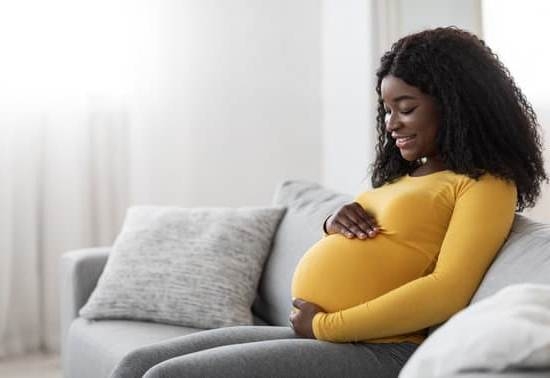Introduction
Pregnancy is typically defined as beginning on the first day of a woman’s last menstrual period, and lasting until delivery. Early pregnancy is generally considered to occur in the first trimester (weeks 0-13). Stress during early pregnancy can have a very real physical impact on your growing baby. Studies have demonstrated an association between chronic stress and higher rates of miscarriage. The body’s natural response to stress hormones can reduce blood flow to the uterus and impede embryo implantation into the placenta.
Impact of Stress During Early Pregnancy
According to research, when there are periods of extreme stress, such as illness or death in the family, there is an increased likelihood of pregnancy loss. This could be due to the imbalance of hormone ratios caused by high levels of cortisol during times of intense stress. Research has also linked high stress levels with complications during childbirth including preterm birth and small for gestational age babies. Additionally, anxiety about the current situation or a refusal to believe that the pregnancy is viable may lead to poorer prenatal care, leading to further problematic outcomes for both mother and baby alike.
Long-Term Effects
Stress during early pregnancy can benefit newborns in some ways; for example, lower exposure of stress hormones has been linked with reduced reactivity levels in babies after being born and better sleeping patterns among infants’ whose mothers experienced less acute or chronic stress during their pregnancies. However it is important to note that having too much stress during early pregnancy can have long-term implications for child development later on life; exposure to high levels of cortisol have been associated with cognitive deficits in children at school age, indicating that fear and distress in gestation can compromise long term brain health and development in offspring later down the line.
What Causes Stress During Early Pregnancy?
Stress during early pregnancy can be due to a variety of factors. Job loss or changes to one’s career can lead to financial insecurity, which can cause stress and worry throughout the early stages of pregnancy. Difficult personal relationships can also impact the mother’s mental health, whether it is distress within her family or romantic relationship. Moving homes, making lifestyle changes, upcoming tests and exams, or health concerns may also increase levels of stress during this period. Additionally, high-stress environments such as workplaces with grueling hours and physical challenges may wear on any prospective mother. Finally, fear surrounding complications related to childbirth or the baby itself such as preterm labor, disabilities, or developmental problems might lead to higher levels of stress while pregnant.
Symptoms to Look Out for When Stress is Present in Early Pregnancy
When a woman is pregnant, it is important to be aware of the signs and symptoms of stress as they may indicate that there is an underlying issue. Stress can lead to a variety of complications, including miscarriage in early pregnancy. The most common indicators that stress may be present in early pregnancy include headaches, nausea, fatigue, trouble concentrating, difficulty sleeping, anxiety and depression. Other physical signs to look out for are clenching or grinding teeth, shallow breathing and extreme changes in appetite. Mental health issues associated with stress such as irrational thinking patterns like catastrophizing should also prompt further investigation. A qualified medical practitioner should be able to help diagnose the cause and provide treatment options for managing the underlying issues safely throughout pregnancy.
How Can Stress Increase Risk of Early Pregnancy Miscarriage?
Studies have shown that stress can affect the various hormones involved in pregnancy and labor, increasing the risk for miscarriage during the first trimester. When a pregnant woman experiences heightened levels of cortisol due to stress, it can lead to increased cell death in placental tissue. This in turn affects the amount of oxygen and nutrients that reach the fetus, potentially weakening or stopping its development. Stress can also affect progesterone levels, which play a major role in maintaining a healthy pregnancy. If progesterone levels are too low due to stress-related dysregulation, this can lead to an abnormal development of the placenta and further increase the risk of early pregnancy miscarriage. Additionally, high levels of emotional stress can cause physical changes such as elevated heart rate or raised body temperature, both of which can be dangerous for an unborn baby and increase chances of miscarriage.
Managing Stress During Early Pregnancy
Stress in early pregnancy can certainly cause miscarriage, so it is important to take steps to maintain a healthy lifestyle and manage any stress that arises. Exercise, such as yoga and light walking, can be beneficial for reducing stress during early pregnancy. It is also important to make sure you have a balanced diet to keep energy levels up and ensure the baby receives proper nutrition. Additionally, developing good sleep habits can help manage hormones related to stress. Taking time for self-care with activities that promote relaxation, such as reading or listening to music can go a long way in helping cope with stress during pregnancy. It is also important to seek out emotional support from family and friends or talk to a mental health professional if needed. Stress management techniques such as deep breathing, progressive muscle relaxation and guided imagery could be helpful in relieving stress too. Ultimately, remaining mindful about what triggers your stress and getting adequate rest are key for staying healthy throughout pregnancy.
Summary and Sources of Further Information and Support
Stress during early pregnancy has been increasingly linked to miscarriages and preterm labor. However, further research is needed to determine the exact cause-and-effect relationship between stress and miscarriage.
The main sources of stress that can contribute to miscarriage in early pregnancy are extreme emotional distress, such as a death in the family or major life changes, physical trauma, such as an injury or dangerous situations, chronic illness or disorder, financial worries and work-related stress. Some studies have connected chronic psychological distress on its own with an increased risk of miscarriage. Evidence from population studies indicates that serious life events before and during the first trimester may increase the risk for spontaneous abortion.
It is important for women who are pregnant or planning on becoming pregnant to be aware of possible sources of stress and how to manage them if they arise. Support groups, counselors, books on coping with pregnancy or counseling may provide comfort and help diminish negative emotions related to some stressful situations that can trigger miscarriages. Coping strategies like relaxation techniques, yoga and physical exercise can also be beneficial in relieving stress during pregnancy and decreasing the risk of miscarriage due to stress.

Welcome to my fertility blog. This is a space where I will be sharing my experiences as I navigate through the world of fertility treatments, as well as provide information and resources about fertility and pregnancy.





